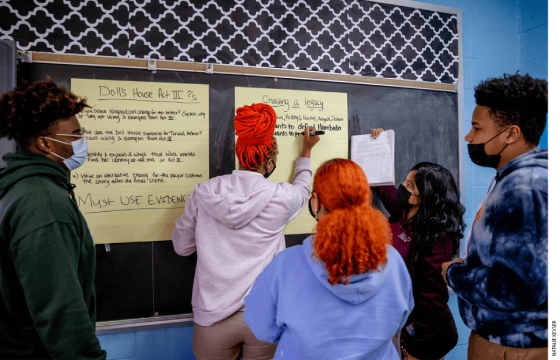The article discusses the Bard High School Early College model, where high school students simultaneously earn their high school diploma, up to 60 college credits, and an associate degree over four years. Bard College’s president, Leon Botstein, conceived this model more than 20 years ago to provide a more rigorous educational challenge for high school students. The schools are designed to bridge the gap between high school and higher education, offering students the opportunity to earn transferable college credits for free.
The article highlights the success of early-college programs in improving students’ chances of applying to and earning a college degree, especially for traditionally underrepresented groups. Studies indicate that over 45 percent of early-college students receive a college degree within six years of high school graduation, compared to one in three non-early-college students.
Bard currently operates seven early-college high schools in various cities, enrolling around 3,000 students. The model has gained popularity, with more than 300 schools in at least 28 states adopting the early-college concept. The article also notes that the Bard early-college schools are among the few sponsored by a four-year college.

The narrative traces the development of Bard High School Early Colleges from Botstein’s idea in 1997, with the first school opening in Manhattan in 2001. The model involves students learning from college professors throughout their four years and starting college-level work in 11th grade. The article emphasizes the importance of collaboration with school districts for the success of Bard schools, highlighting the challenges and negotiations involved in establishing new schools.
The piece discusses the rigorous admissions process for Bard early-college schools, which typically includes interviews, writing samples, and, in some cases, reviews of students’ grades and attendance. While Bard schools are “slightly selective,” with acceptance rates ranging from 35 to 50 percent, they aim to identify intelligent and capable students who may not have excelled in traditional settings.
The article addresses the misconception that the courses offered at Bard High School Early Colleges are not “real” college classes. It emphasizes the legitimacy of the college-level work and the efforts to convince college admission officers of its authenticity. However, the transferability of credits remains a challenge, with not every college accepting credits earned at Bard early-college schools.
Despite obstacles, the Bard High School Early College model is considered successful, and the article concludes by discussing the slow growth of these schools compared to other models like P-Tech, which has opened 300 public schools nationwide in the past decade.


























